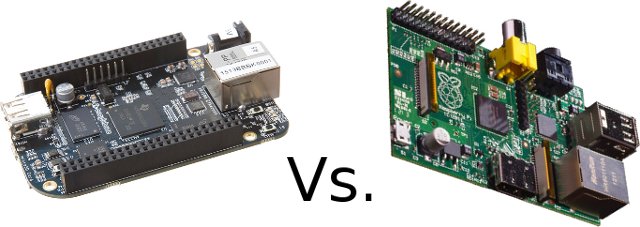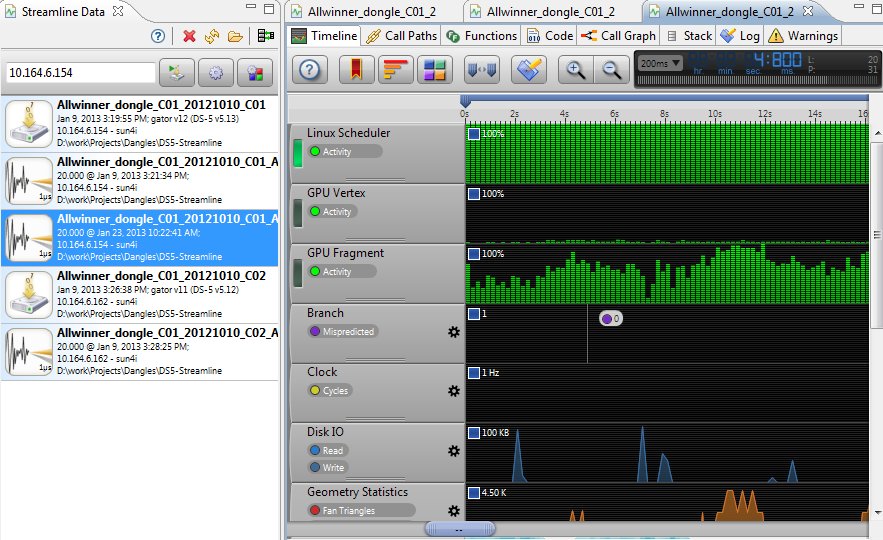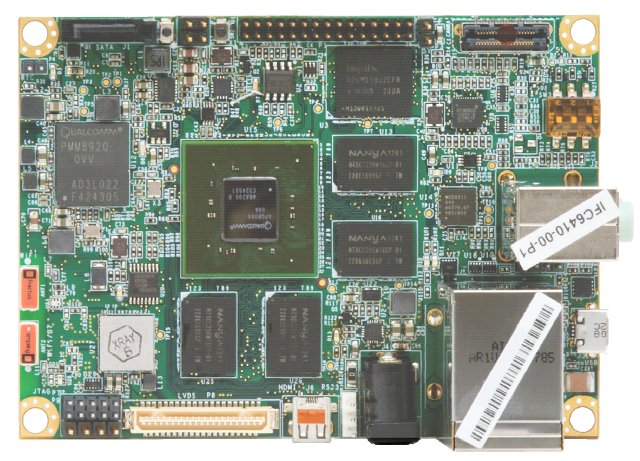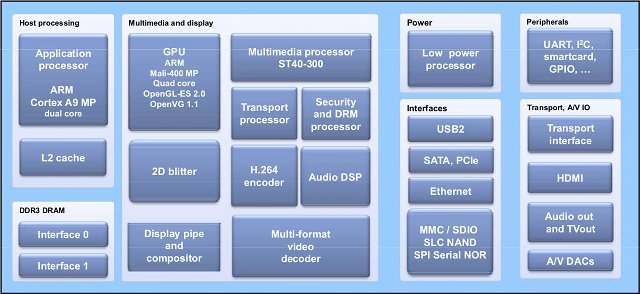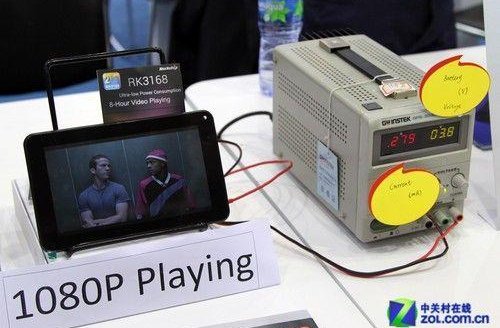The Beagleboard community officially announced the BeagleBone Black and its $45 price tag on the 22nd of April. Many blogs and news sites touted it as a Raspberry Pi killer, and R-Pi vs BBB fanboys fights ensued, and many articles with incorrect information or heavily biased were published. There’s however one decent BeagleBone Black vs Raspberry Pi comparison from a robotic point of view, so I’ll build from there with some corrections and additions. I’ll compare both the features and the price differential between the Raspberry Pi Model B and BeagleBone Black boards depending on use cases. BeagleBone Black vs Raspberry Pi – The Features BeagleBone Black Raspberry Pi Model B Comment Processor TI Sitara AM3359AZCZ100 Cortex A8 @ 1GHz(will be changed to AM3358BZCZ100 in future versions) Broadcom BCM2835 ARM11 @ 700 MHz (Overclockable to 1GHz) Even thoughboth processors can run at the same frequency (after overclocking the R-Pi), but […]
Using ARM Development Studio 5 (DS-5) Streamline with MK802II mini PC
MK802-II is an Android 4.0 mini PC powered by AllWinner A10 (ARM Cortex A8) with 1GB RAM and 4GB flash. Instructions are also available to run Ubuntu, or other Linux distributions. ARM Development Studio 5 (ARM DS-5) is software development tool suite for ARM processors that can be used for both Linux and Android debugging, and available in 2 versions: professional edition and community edition, the latter being free of charge. I’m writing about both today, because Bob Peng, Technical Marking Engineer for ARM China, recently wrote a blog post in Chinese [Update: An English version is now available] showing how to use MK802-II, preloaded with the required drivers and daemon, with DS-5 Streamline Performance Analyzer with is part of both versions. The community edition may be missing some features of Streamline however. Streamline Performance Analyzer allows you to: Find out which modules or functions to take up most of […]
$149 Inforce Computing IFC6410 Board Features Qualcomm APQ8064 Quad Core SoC
I’ve only seen Qualcomm SoC in smartphones and tablets, as well as their own development boards, but Inforce Computing has just changed that thanks to IFC6410 single-board computer powered by Qualcomm Snapdragon S4 Pro APQ8064 quad core krait processor @ 1.7GHz. This Pico-ITX SBC comes with 2GB RAM and 4GB eMMC flash, HDMI out, Gigabit Ethernet, Wi-Fi and more. Here are the specifications of this board: SoC – Qualcomm Snapdragon S4 Pro APQ8064 Quad Core Processor (1.7GHz) + Adreno 320 GPU System Memory – 2GB on-board PCDDR3, up to 533MHz Storage – 4GB eMMC + μSD card connector + SATA interface Connectivity: 802.11 b/g/n WiFi (Atheros QCA6234) Bluetooth 4.0 (Atheros QCA6234) 10/100/1000bps Ethernet (Atheros 8151) Video and Audio Interfaces: μHDMI (1080p) LVDS MIPI-CSI2 (4-lane, up to 20MP camera) HD Audio and Mic-in USB – 2x USB 2.0, 1x USB OTG Misc I/O – 1x I2C, 1x SPI, 1x UART, UIM, […]
STMicro STiH416 Dual Core Media Processor and Linux SDK
STMicro announced STiH416 SoC for media players at CES 2012 with very few details, but we’ve still known that it is a dual core Cortex A9 @ 1.2 GHz coupled with a quad core Mali-400 manufacturer and an hardware video decoder supporting commonly used codecs such as H.264, VC-1, AVS and MPEG2. Yesterday they put out a press release about a STB development platform based on this solution, and I found out we’ve got much more information now. Key features include: ARM Cortex-A9, dual core CPU, SMP NEON SIMD engine yielding up to 6000 DMIPS ARM Mali-400 quad core GPU yielding up to 1600 Mpixels/s fill rate and supporting up to 1080p60 or 1080p30 stereoscopic 3D graphics Dual HD H.264/VC-1/AVS/MPEG2 video decoder or SVC video decode MVC video decode for 3DTV: supports up to 1080p60L/60R, 3D video formats Dual HD internet video decoding: real video 8/9/10, DivX, Xvid, MP4p2, Adobe […]
Booting Linux in Less Than 1 Second in AllWinner A10 Devices? Yes! You Can!
threewater, a Chinese developer, has just posted a very interesting demo on linux-sunxi mailing list showing a device based on AllWinner A10 boot linux within 0.85s, and if you add a Qt app, the total time is just about 1.2s. This appears to be a custom hardware (EM6000), but we do know it’s based on AllWinner A10, comes with 512 MB RAM, and 4GB NAND Flash. On the software side, the device runs kernel 3.4 from linux-sunxi, with a customized version of uboot, a squashfs rootfs, and a Qt 4.7.4 app showing a gauge. Both the rootfs (7MB) and the kernel (2MB) have been compressed with LZO. All that boots from NAND flash for optimal speed. The 1.2 second time includes kernel + rootfs + app time, and the total time is a bit longer, but this is still impressive. Here’s the boot log:
|
1 2 3 4 5 6 7 8 9 10 |
[1.690000 1.690000] U-Boot SPL 2013.01-05984-g2120a27-dirty (Apr 17 2013 - 14:22:02) [0.009000 0.009000] Board: EM6000 [0.012000 0.003000] DRAM: 512MB [1.014000 1.002000] init startup v1.1 [1.016000 0.002000] mount usr data error 2 [1.158000 0.142000] Could not read calibration: "/data/etc/pointercal" [1.166000 0.008000] Couldnt open tslib config file: No such file or directory [1.175000 0.009000] QWSTslibMouseHandlerPrivate: ts_config() failed with error: 'No such file or directory' [1.187000 0.012000] Please check your tslib installation! [1.200000 0.013000] qt show |
If you just boot to […]
How to Detect if an ARM ELF Binary is Hard-float (ARMHF) or Soft-float (ARMEL)
If some cases you may want to know if a library or binary built for the ARM architecture is using hard-float (armhf) or soft-float (armel). You can analyze ELF binary using readefl utility, so let’s have a try. First let’s install some armel and armhf files on a computer running Ubuntu by install gcc/g++ toolchain for armel and armhf:
|
1 |
apt-get install g++-arm-linux-gnueabi g++-arm-linux-gnueabihf |
We now have armhf and armel libraries installed in /usr/arm-linux-gnueabihf/lib and /usr/arm-linux-gnueabi/lib respectively. Let’s check the output of readelf filtered with “FP” string for libm.so.6 for armel:
|
1 2 3 4 5 6 7 |
readelf -a /usr/arm-linux-gnueabi/lib/libm.so.6 | grep FP Tag_FP_arch: VFPv3-D16 Tag_ABI_FP_denormal: Needed Tag_ABI_FP_exceptions: Needed Tag_ABI_FP_number_model: IEEE 754 Tag_ABI_HardFP_use: SP and DP |
and armhf:
|
1 2 3 4 5 6 7 8 |
readelf -a /usr/arm-linux-gnueabihf/lib/libm.so.6 | grep FP Tag_FP_arch: VFPv3-D16 Tag_ABI_FP_denormal: Needed Tag_ABI_FP_exceptions: Needed Tag_ABI_FP_number_model: IEEE 754 Tag_ABI_HardFP_use: SP and DP Tag_ABI_VFP_args: VFP registers |
Great, so there’s an extra line for armhf (Tag_ABI_VFP_args) that seems to confirm the library is hard-float. With readelf compiled from elftoolchain-0.6.1 (source code), the extra line will be a bit different: “Tag_ABI_VFP_args: AAPCS (VFP variant) AAPCS stands for ARM Architecture Procedure Call Standard. You can read more details on ARM website. There are also two other possible values […]
How to Use Libhybris and Android GPU Libraries with Mer (Linux) on the Cubieboard
You may have heard about libhybris, a library that cleverly loads Android HW adaptations and convert calls from bionic to glibc. One of the greatest achievement of this library is to allow Android GPU drivers to be used with Linux, and is notably used by Canonical, although they did not write it, for Ubuntu 14.04 which will be compatible with any recent Android smartphones or tablets. One way to get started with libhybris is to port a device to Ubuntu Touch, but this may take a while. However, I’ve found a faster and easier way to play with libhybris thanks to Martin Brook (vgrade) who wrote a tutorial on how to use libhybris with Mer on the Cubieboard. Mer is an open source mobile Linux distribution powered by Qt/QML and HTML5, that’s born from the ashes of Meego, and is now used in the upcoming Sailfish OS. You’ll need to […]
Rockchip Unveils RK3168 Dual Core Processor, Showcases $10 Miracast Adapter
Rockchip is currently at the Hong Kong Electronics Fair showing off their RK3188 quad core processor, and corresponding products such as tablets, gamepads, HDMI TV dongles, etc… Business seems good as they already received orders for 800k pieces in about a month, and they expect to sell 10 to 15 millions over the course of the year. The company had also a few RK3066 devices on display, but more interestingly they announced RK3168, which also a dual core Cortex A9 processor, but with lower power consumption thanks to 28nm HKMG process, instead of the 40nm process used for Rockchip RK3066. They have a tablet prototype without battery connected to a power supply to show the power consumption, and the tablet under test consumes 280mA @ 3.8V (About 1 Watt) when decoding 1080p videos with the display brightness set to about 50%. Chen Feng, Vice President at Rockchip, explains that with […]


